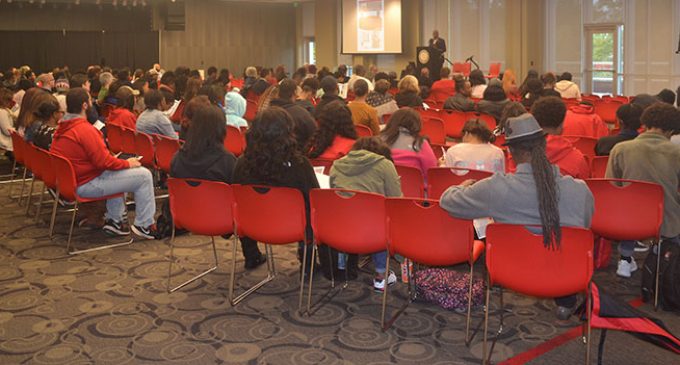Civil rights activist Charles E. Cobb Jr. talks about his life

Above: The J. Alston Atkins Memorial Lecture in Constitutional Law has become one of the more anticipated events during Homecoming Week at Winston-Salem State University. Charles E. Cobb Jr. answered a number of questions about the Civil Rights Movement and his new book during the lecture on Monday, Oct. 26. (Photo by Tevin Stinson)
Charles E. Cobb Jr. delivers WSSU memorial lecture
By Tevin Stinson
The Chronicle
Over the years, the J. Alston Atkins Memorial Lecture in Constitutional Law has become one of the more anticipated events during Homecoming Week at Winston-Salem State University (WSSU).
Since 1985 attorneys, educators, authors and civil rights activists have been invited to speak and give their opinions on constitutional law and social justice in the state and country.
This year, the WSSU family invited Charles E. Cobb Jr. to deliver the lecture. From 1962 until 1967. Cobb was a Mississippi field secretary for the Student Nonviolent Coordinating Committee (SNCC).
J. Alston Atkins Memorial Lecture was named after Jasper Alston Atkins, the youngest son of WSSU founder Simon Green Atkins, and Oleona Pegram Atkins. Jasper was responsible for bringing a number of crucial cases before the court that change the landscape of public schools in Winston-Salem and the state.
J. Alston Atkins vs. State Board of Education of North Carolina, Winston-Salem/Forsyth County Board of Education, Board of County Commissioners of Forsyth County and City of Winston-Salem, sought elimination of racially dual school systems in Winston-Salem and throughout the state.
The case was a catalyst for the NAACP’s “Catherine Scott” case, which ultimately desegregated the Winston-Salem/Forsyth County Schools.
Vice-Chancellor for University Advancement Michelle Cook expressed how important Jasper Atkins’ work in the city really was.
“I can’t think of another way to honor a man that has done so much for the university and the city,” Cook said. “These are the types of programs that need to happen to improve the lives of African-Americans.”
Cobb was a founding member of the National Association of Black Journalists (NABJ).
He is currently a visiting-activist scholar at Duke University, and author of “This Nonviolent Stuff’ll Get You Killed: How Guns Made the Civil Rights Movement Possible.”
During the hourlong sit-down with the Corey D.B. Walker, dean of the College of Arts and Sciences, Cobb discussed the struggles he faced during his time with SNCC and living in Mississippi during a time when being black could get you killed.
When asked why he decided to write the book, he said, “I decided to write the book because I wanted to tell the story of the people in the backwood towns no one had ever heard of.
“What I was interested in is the organizing tradition,” he commented. “I could have wrote a book on the march in Selma butI was more interested in the grassroots movement.”
After the lecture, Andre Harrison said that he learned a lot about the civil rights movement that he had never heard before.
“Mr. Cobb did a great job of telling real life stories that we as students can relate to,” said Hamson “We all know the stories of Dr. King and other big names of the Civil Rights Movement, but its good to hear accounts from those who were behind the scenes.”











